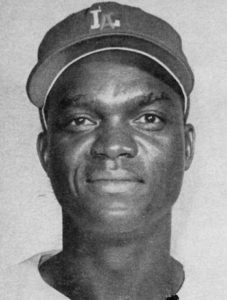
Lorenzo "Piper" Davis
This date, in 1913, marks the birth of Lorenzo "Piper" Davis, a baseball and basketball player.
He was from Piper, AL, a coal-mining community in the hills around Birmingham. As a teenager, Davis attended a segregated public high school for colored boys in Fairfield, just up the road from Piper. There, he earned a basketball scholarship from Alabama State University in Montgomery. After a year starring on the Alabama State basketball squad, Davis was forced by family financial circumstances to drop out of college and find a job.
Davis found employment in a Birmingham steel mill and, shortly after that, joined the mill's all-Black baseball team in the Birmingham City League. He gained experience playing against barnstorming professional Black clubs and realized his baseball talents might be good enough to land him a spot on a traveling team. In 1936, he signed on to play with the Omaha Tigers (a black team that traveled through the Midwest). When the team encountered financial difficulties at the end of the 1936 season, Davis once again found himself in Birmingham playing on industrial teams.
One of the most versatile players in baseball history, he could play any position expertly, run, and hit with power and average. A real star in the Negro Leagues, he teamed with Ed Steele and Art Wilson in the Black Barons lineup to produce one of Negro baseball's most powerful squads during the 1940s. The Birmingham Black Barons won the Negro American League (NAL) pennant in 1943 and took the Homestead Grays to the seventh game before losing the Negro World Series.
In 1944 the Black Barons repeated as Negro American League champions but were again unable to overcome the Homestead Grays in the World Series. In almost a repeat of the 1944 season, the Black Barons again took the NAL crown in 1948 but ultimately left the World Series trophy with the Homestead Grays.
He later managed the Barons in 1942 and became the mentor to Willie Mays. Davis' reputation, built on the diamonds of Birmingham's City League, earned him an invitation from Winfield Welch, the manager of the Barons at that time. He was also the head coach of the Harlem Globetrotters basketball team. Welch recognized Davis' basketball skills and signed Davis to play with the Globetrotters during baseball's off-season. Davis remained associated with the Globetrotters throughout his baseball career.
During the Black Baron's reign as the premier team of the Negro American League during the 1940s, Davis was recognized as the team's leader and most impressive player. Four times during the 1940s, Davis was selected to represent the West at the East-West All-Star Classic. He pushed through at least one base hit in each game, usually contributing an RBI, and scored four runs in as many games. In 1948, Davis expanded his field responsibilities with the Black Barons by assuming the team's managerial duties.
Continuing his all-star career at second base, Davis guided the Black Barons to a NAL championship while maintaining his .300+ average at the plate and earning an All-Star game berth. The Boston Red Sox ended their era of racial exclusion in 1950 when they signed Davis to a minor league contract with their Class A affiliate in Scranton, Pennsylvania. After a difficult season of adjustment, Davis returned to the Boston camp in 1951 but was not retained for the season. Davis starred in the Class AAA Pacific Coast League with the Oakland Oaks for the next five seasons.
In 1955, Davis traveled the California coast to join the Los Angeles Angels, where he played three seasons with Gene Mauch and other West Coast luminaries. From Los Angeles, at 41, Davis was promoted to a management position in Double-A ball and joined the Fort Worth Cats as a player-manager. Age, the inevitable enemy of all athletes, was catching up with him, and after a single season with the Cats, Davis was ready to call it a day.
Before retiring in 1986, Davis served in professional baseball for an additional 25 years as a scout for numerous teams, including the Detroit Tigers, St. Louis Cardinals, and Montreal Expos. Davis was inducted into the Alabama Sports Hall of Fame in 1993. Lorenzo "Piper" Davis died on May 21, 1997.
The Negro Baseball Leagues A Photographic History
By Phil Dixon with Patrick J. Hannigan
Copyright 1992, Jed Clauss and Joanna Paulsen
Ameron House Publishing
ISBN 0-88488-0425-2